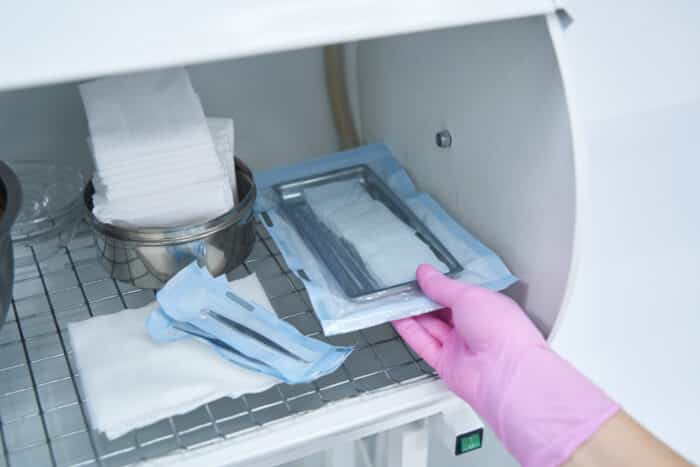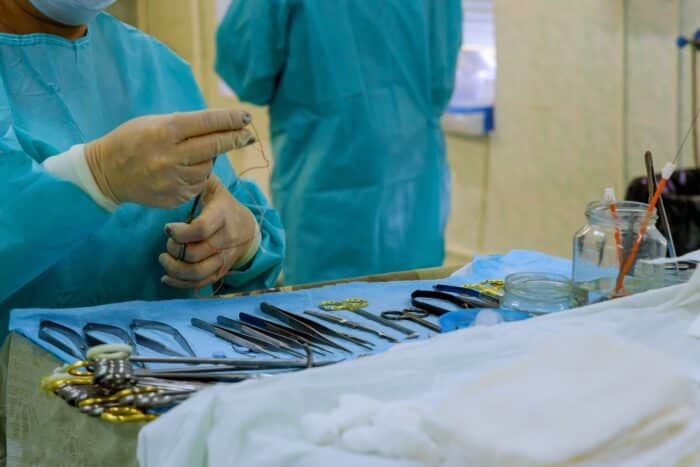If you’re here, you might be interested in pursuing a career in healthcare as a sterile processing technician.
But, what is the process of becoming one? And is it difficult?
Becoming a sterile processing technician might sound intimidating, but we’re here to tell you it’s not.
Sterile Processing Technicians, or SPTs, are considered the backbone of any clinic or hospital since their duties revolve around sterilizing and cleaning the instruments and tools used in any healthcare setting.
In this article, we will uncover what an SPT is in detail, how to become one, and how their training programs differ. We will also answer some common questions about the career so that you can get a clear picture of pursuing this rewarding field.
So, let’s get right into it.
What is a Sterile Processing Technician?
Imagine you’re at a hospital or clinic, getting medical help. You know those tools the doctors use? Have you ever wondered how they keep them super clean and safe for you? Well, that’s where the amazing sterile processing technicians step in.
These technicians work behind the scenes. Their main job? Making sure every single tool used in medical procedures is clean and sterilized.
Every day, they sort through huge amounts of equipment and tools, use sterilization techniques to decontaminate them, and check everything to be sure it’s clean.
Also See: What is a Sterile Processing Technician
How to Become a Sterile Processing Technician?
Now that you know what these heroes do, the reason you’re still here is you might be wondering about the process of becoming one.
Let us help you with that.
Here is a step-by-step guide on how you can become a sterile processing tech:
Finish high school or earn your GED:
Your initial step is completing high school or getting a General Education Development (GED) certificate. This forms the foundation—it’s the essential requirement for stepping into the world of sterile processing.
Select the right training program and enroll:
Look for a program that covers both theoretical knowledge (what you learn from books) and hands-on skills in sterile processing.
Choosing the right program makes a big difference in your success here. There are three main paths for your sterile processing tech training: earning an associate degree, getting a diploma, or opting for an online training program.
More on these paths later.
Acquire hands-on experience:
Internships or externships are golden chances to gain practical skills. Many online programs offer these opportunities after finishing coursework, letting you practice using equipment and maintaining a sterile environment.
Become certified as a sterile processing technician:
Employers highly value certification, though it might not be required everywhere. Certifications like the Certified Registered Central Service Technician (CRCST) or the Certified Sterile Processing and Distribution Technician (CSPDT) are offered by different reputed organizations.
The CRCST exam is one of the most recommended certifications to go for as an aspiring sterile processing tech with no experience since the other certifications are for more advanced individuals.
Read: Sterile Processing Technician Certification
Start job hunting:
Once certified, explore positions in hospitals, clinics, labs, or other healthcare settings that need sterile processing technicians.
Sterile Processing Technician Training: How Long Does Each Program Last?
When you’re thinking about becoming a sterile processing technician, there are different ways to get trained as one. Knowing the differences between these programs will help you choose the right one for you.
You don’t need a fancy degree to start as a sterile processing tech, but having a high school diploma or GED is a must to join any training program.
Some programs can get you ready in just six weeks, but the ones we suggest usually last three months or even longer.
You could also go for an associate degree program. It gives you a certificate that bosses sometimes favor, but it can be expensive.
There are three main ways to train as a sterile processing tech:
1. Get an associate degree from a full-time college or university.
2. Get a diploma from a community college.
3. Take online courses or programs (most recommended).
Let’s take a closer look at these options and compare how long they take, how much they cost, and what you’ll learn.
How Long Does an Associate’s Degree Take for Sterile Processing Techs?
Duration: 2 Years
Cost: $10,000 to $30,000
Joining a technical college or university for a sterile processing technician program means going for an associate’s degree, which usually lasts about 2 years.
This degree from a college or university covers a lot of ground and gives you a good grasp of everything you need to know.
Spending more time in this program lets you learn in a comprehensive manner and become skilled before you start working in the field.
The coolest thing about getting a degree like this is the University Certificate you earn when you finish. This certificate makes employers trust you more and looks great on your resume when you’re just starting your career.
But there’s a downside to going for an associate’s degree—it can be pretty expensive.
Out of the options available, this type of degree tends to cost the most, somewhere between $10,000 to $30,000, which might mean taking out student loans.
Also, it takes a while—2 years of going to classes on campus regularly. You have to think about the cost of traveling, where to stay, and other everyday expenses before jumping into this.
Even though getting an associate’s degree covers a lot about sterile processing, there are some extra classes in general subjects that make the program longer. These extra classes might not be directly useful when you start as a Sterile Processing Technician.
Also Read: What Does a Sterile Processing Technician Do?
How Long Does a Sterile Processing Tech Diploma Take?
Duration: 6 Months to 1 Year
Cost: $5000 to $8000
Many community colleges offer a diploma that lasts from 6 months to a year.
Getting a sterile processing tech diploma from one of these colleges is faster than getting an associate’s degree. It takes about half the time and costs less too, roughly between $5000 to $8000.
But like with degrees, you still gotta stick to a class schedule with a diploma.
These diploma programs are speedier to finish, skipping those extra classes you’d normally take in a degree program.
They cover the important subjects you need to know and the basic skills for sterile processing pretty quickly.
Take a look at Preppy’s Online Sterile Processing Tech Training Program here>
How Long Do Online Medical Assistant Programs Take? (Recommended)
Duration: 3 to 9 Months
Cost: $1200 to $4000
Choosing online courses or programs for becoming a sterile processing technician is often recommended as it is the most affordable, convenient, and quickest way to acquire the necessary skills for entering this field.
There are programs that can be finished in just 4 weeks. However, an ideal program designed to prepare you for this career might take between 4 to 6 months to complete.
With online classes being pre-recorded, you have the freedom and flexibility to learn at your own pace, fitting it into your schedule without the need for travel or adhering to strict timetables.
These online programs are more budget-friendly compared to other options, typically ranging from $2500 to $4000.
The only drawback is ensuring the credibility of the training program, as some might lack accreditation. That is why it’s important to ensure the program you choose is accredited.
Opting for an online program is recommended as it provides the skills and knowledge needed to enter the field in half the time of other programs.
Some online courses even help connect you with potential employers, easing your job search once you complete the course.
So, in a nutshell, why consider online training?
– It’s often more cost-effective.
– You can finish training in as little as 2 to 4 months.
– Learn from anywhere, at your own speed.
– Some programs offer real healthcare experience through externships after completion.
Also Read: Certified Sterile Processing Technician
Next Steps After Completing Your Sterile Processing Training
Upon completing your training as a sterile processing technician, you’ll need to take certification exams to become certified in this specialized field. This step isn’t always necessary, however, it’s highly preferred by employers since it shows your capability of handling the everyday tasks and knowledge of an SPT.
For beginners, it’s advisable to consider certifications like the Certified Registered Central Service Technician (CRCST) provided by the International Association of Healthcare Central Service Materiel Management (IAHCSMM) or the Certified Sterile Processing and Distribution Technician (CSPDT) offered by the Certification Board for Sterile Processing and Distribution (CBSPD).
Once you successfully pass these certification exams and obtain your certification as a sterile processing technician, you can connect with prospective employers and healthcare facilities.
Learn more: Travel Sterile Processing Technician
Top 5 Reasons to Become a Sterile Processing Tech
The next thing that might have crossed your mind is: is becoming a sterile processing tech worth it?
Well, it really is, and let us give you five reasons why we think so:
- Important Role in Healthcare: As a sterile processing technician, you play an important role in ensuring patient safety. You’re responsible for cleaning and sterilizing medical instruments, contributing significantly to preventing infections and maintaining a sterile environment for medical procedures.
- Essential Contribution to Healthcare Teams: You’re an integral part of the healthcare team, working behind the scenes to support doctors, surgeons, and nurses. Your efforts directly impact the success of surgeries and medical treatments by providing sanitized instruments and equipment.
- Continuous Learning and Growth: The field of sterile processing is dynamic and offers continuous learning opportunities. From staying updated with the latest sterilization techniques to understanding cutting-edge medical equipment, there’s always something new to learn, keeping your skills sharp and evolving.
- Job Stability and Demand: Healthcare is an ever-growing field, and the need for sterile processing technicians continues to rise. Your skills are in demand across various healthcare settings, including hospitals, clinics, and surgical centers, ensuring a stable career path with potential for growth.
- Rewarding Work Environment: While your role might be behind the scenes, the satisfaction of knowing that your attention to detail directly contributes to patient well-being is rewarding.
Read: Sterile Processing Technician Certificate Program Online
FAQs
Is Sterile Processing Tech School Worth It?
Sterile processing tech school can be different for everyone. Some parts might be tough for some people. You learn about keeping medical tools clean and safe, which can be a bit tricky. Paying close attention to details is really important in this job, and that might be hard for some.
Just like any school, how well you do depends on how much time and effort you put in. Some bits might be harder for some people, but many students who really like this field do well.
Is Sterile Processing Tech a Good Career?
Being a sterile processing tech can be a great career for a few reasons. First off, it’s a job that’s always needed in healthcare, so you can count on steady work. You get to make a big impact on patient safety by making sure medical tools are super clean.
Plus, there’s always something new to learn as the field keeps growing. You can work in different places like hospitals or labs, which keeps things interesting. With more experience and extra certifications, you can move up in your career too.
See: Sterile Processing Technician Salary
Related Resources:
Related Articles
-
How to Be Successful in College in 2022 – 7 Simple Tips to Succeed
-
How Do Scholarships Work? Read This First…Truth is Shocking
-
7 Best College Majors 2024: What Should I Major In?
-
How to Choose a College – 10 Things You Must Consider in 2024
-
Why Go to College? Top 13 Benefits for Adult Students in 2022
-
Top 5 Best Alternatives to Community College for 2024








